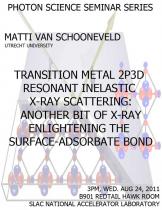Speaker: Matti van Schooneveld, Utrecht University
Program Description
Metal nanoparticles play a big role in nanotechnology and catalysis, but their electronic interactions with adsorbates are difficult to probe. A combination of X-ray spectroscopic techniques and computational chemistry [1], as well as surfaces science tools, allow them to be studied. It remains difficult to obtain information on the chemical bonds between only the surface and the adsorbates. Here we show an alternative application of transition metal 2p3d resonant inelastic x-ray scattering (RIXS) where only site-selective information of this bond is obtained through the observation of low-energetic dd-excitations. Our work is performed at the ADRESS beamline at the Swiss Light Source (SLS) with a spectral resolution <0.1 eV [2]. These previously unobserved RIXS features are interpreted with time-dependent density-functional-theory (TD-DFT) [3] and charge transfer multiplet (CTM) calculations [4] to generate insight to the surface-adsorbate interface.
[1] A. Nilsson, L.G.M. Pettersson, J.K. Nørskov, Chemical bonding at surfaces and interfaces, 1st ed., Elsevier, Amsterdam, The Netherlands 2008.
[2] M.M. van Schooneveld et al., in preperation.
[3] F. Neese et al., Coord. Chem. Rev. 2006, 205, 288; F. Neese, J. Biol. Inorg. Chem. 2006, 11, 702.
[4] E. Stavitski and F.M.F. de Groot, Micron 2010, 41, 687.





